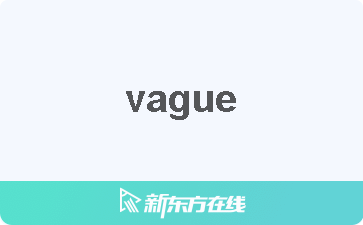- 雅思资讯
- 雅思备考
- 雅思试题
- 互动辅导
新东方-柯林斯雅思备考词典
vague
英 [veɪg]
[ADJ]

vaguer , vaguest
1. (文字或言语)含糊的 , 不明确的 , 不清楚的
2. (记忆或想法)模糊的 , 不清晰的
If you have a vague memory or idea of something, the memory or idea is not clear.
近义词
双语例句
例:They have only a vague idea of the amount of water available.
他们只是大概知道可用水的总量。
3. 含糊其辞的
If you are vague about something, you deliberately do not tell people much about it.
双语例句
例:He was vague, however, about just what US forces might actually do.
然而,他对美军实际可能采取的行动却含糊其辞。
例:Marx was intentionally vague about the structure and functioning of the socialist economy.
马克思故意对社会主义经济的结构和运转含糊其辞。
4. (感觉等)轻微的
If something such as a feeling is vague, you experience it only slightly.
双语例句
例:He was conscious of that vague feeling of irritation again.
他又一次感到有点儿恼火。
5. (外形或轮廓)模糊不清的
A vague shape or outline is not clear and is therefore not easy to see.
双语例句
例:The bus was a vague shape in the distance.
远处的那辆公共汽车只是一个模糊不清的轮廓。